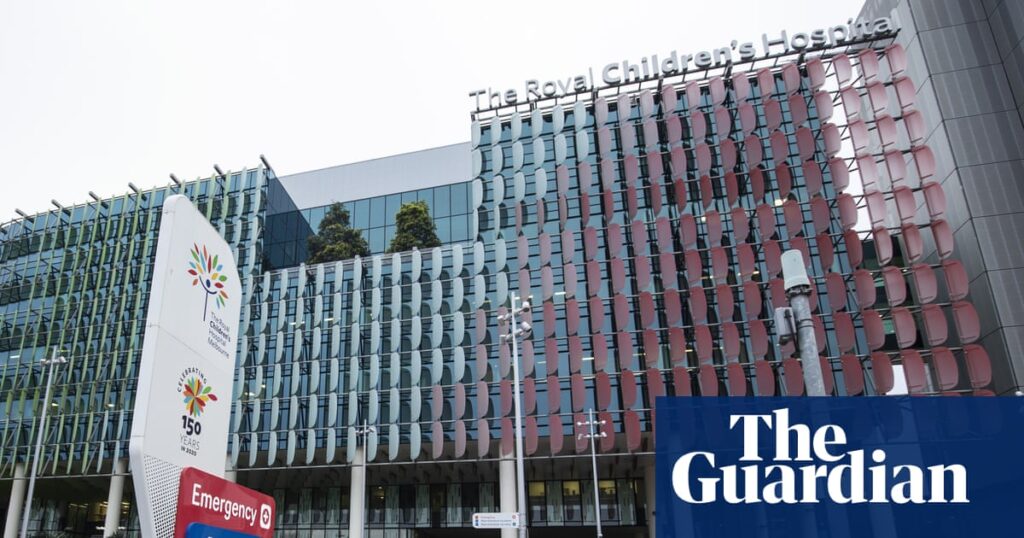Doctors have expressed outrage after Melbourne’s Royal Children’s hospital (RCH) suddenly cancelled a planned panel discussion on the effects of war on children’s health, just days after its chief executive received a letter alleging the event would pose a risk to Jewish staff and patients.
The “Children and War” event was scheduled for 17 September as part of the RCH’s weekly educational and professional development all-staff meetings, known as “grand rounds”. It was described as an exploration of “what war means for children, and how health professionals can help protect and care for those affected”.
In the letter to the RCH chief executive, Dr Peter Steer, seen by Guardian Australia, Sydney-based psychiatrist Dr Doron Samuell argued the event should be cancelled on the basis that Jewish staff or patients would be subject to the risk of “moral injury, vicarious trauma and harmful workplace behaviours” if it were to go ahead. The letter was dated 9 September and copied in WorkSafe Victoria.
Samuell wrote that the event “inadvertently provid[es] a platform for groups that have engaged in hateful, partisan campaigns against Israel and its supporters”.
The groups listed as such were Médecins Sans Frontières (MSF), the Medical Association for Prevention of War (MAPW) and the International Campaign to Abolish Nuclear Weapons (Ican).
Speakers for the event were Associate Prof Tilman Ruff, a co-founder of Ican, which was awarded the 2017 Nobel peace prize; the MAPW president, Dr Sue Wareham; RCH’s immigrant health service head, Associate Prof Georgia Paxton; the MSF paediatric nurse Alison Moebus who has recently worked in Gaza; and the Asia Pacific Network of Refugees founder, Najeeba Wazefadost.
Sign up: AU Breaking News email
The complaint letter from Samuell claimed alleged sources of harm in the event included “war-related content”, “distressing testimony about child casualties”, and that the “one-sided panel of high-profile advocates critical of Israel predictably triggers identity-based conflict, heckling, exclusionary commentary, perceived licence for disparagement of Jewish identities”.
“A hospital-branded session dominated by such advocacy predictably signals hostility to Jewish identities and increases the risk of moral injury, vicarious trauma and harmful workplace behaviours,” Samuell wrote.
Samuell included in his signature the logo of the Australian Alliance Against Antisemitism in Healthcare, a group established in early 2024.
When approached about the letter by Guardian Australia, Samuell said in an email that medical grand rounds “in a prestigious hospital are designed to improve patient outcomes, not host divisive political messaging about foreign conflicts. The Australian health system should avoid all efforts to radicalise staff and remain focussed on providing world class clinical outcomes. It’s what Australian patients should expect and deserve.”
On Thursday 11 September, Steer wrote to panel participants, saying he had made the decision not to proceed with the event on safety grounds. “This decision is not about the importance of the topic itself, but about the risk that the discussion could shift away from a focus on child health and become challenging in ways that may be unhelpful for our staff and their wellbeing,” Steer wrote.
It is not known whether the letter was directly connected to the decision and RCH how many complaints it received about the event.
Guardian Australia understands this is the first time a grand round has been cancelled by the RCH.
More than 1,600 letters had been sent as part of a campaign calling for the event’s reinstatement, and more than 800 people had signed an open letter calling for the same at the time of writing.
after newsletter promotion
The MSF executive director, Jennifer Tierney, said the organisation had worked for decades in war zones, including Gaza, and “MSF’s medical action is based around the principles of impartiality, such that we provide medical care based on need alone, irrespective of politics or religion”.
“It is troubling if, in Australia, public medical institutions cannot host discussions of humanitarian and medical consequences of war,” Tierney said.
“There should be nothing controversial about acknowledging children’s suffering in conflict. For MSF, treating patients and bearing witness to their suffering is a medical duty and an act of solidarity.”
Wareham said the allegation that MAPW had engaged in a “hateful campaign” was “totally wrong and lacking a shred of evidence”.
“What we have strongly criticised is the Israeli government on the basis of evidence.”
A spokesperson for RCH said in a statement that the decision to cancel the event “reflects the feedback of our people and our responsibility to ensure their wellbeing”.
“[I]t is essential that all staff are able to work in an environment where they feel safe. Following consultation with staff, it was clear that continuing with this session would not have met that commitment,” the spokesperson said.
“It does not alter the hospital’s unwavering commitment to providing healthcare for children affected by war, crisis, and violence. That work remains central to our mission.”

